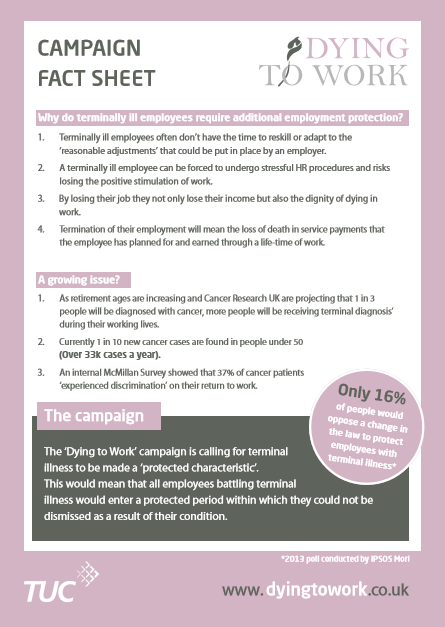 You have just been told that you have a terminal diagnosis. Your world has been turned upside down. You have to manage the range of emotions and daunting realities that a terminal diagnosis means. Frightening…….
You have just been told that you have a terminal diagnosis. Your world has been turned upside down. You have to manage the range of emotions and daunting realities that a terminal diagnosis means. Frightening…….
And then you have to go into work. Perhaps it’s the last thing you want to do? Perhaps it helps to maintain some normality? Who can tell – it’s all unique to the individual. But you would expect your employer to be supportive, to help you and for you to be protected. They won’t sack you right? That’s the law, surely? You can’t sack a terminally ill worker in 21st century Britain? Surely?
- Wrong – you could be sacked. Shocking. Brutal. And just plain morally wrong.
And that is what the TUC’s Dying to Work campaign is all about. The campaign would like to see terminal illness recognised as a ‘protected characteristic’ so that an employee with a terminal illness would enjoy a ‘protected period’ where they could not be dismissed as a result of their condition. Currently workers with a terminal illness are covered by disability legislation which does not prevent dismissal on grounds of capability. Greater protection would give every person battling a terminal condition the choice of how to spend their final months. They would have the peace of mind to know their job is protected and the future financial security of their family is guaranteed.
Why do terminally ill employees require additional protection? Firstly, terminally ill employees often don’t have the time to re-skill or adapt to the ‘reasonable adjustments’ that could be put in place by an employer. What’s more, terminal illness is, by its very nature, degenerative. What may be a reasonable adjustment one day may not be a reasonable adjustment the next. Secondly, a terminally ill employee can be forced to undergo stressful HR procedures and risks losing the positive stimulation of work. Thirdly, by losing their job they not only lose their income but also the dignity of dying in work. Fourthly, termination of their employment will mean the loss of death in service payments that the employee has planned for and earned through a life-time of work.
The issue has too often been under reported because terminally ill workers are particularly vulnerable. Terminal illness is emotionally and physically draining. Most terminally ill workers facing dismissal are unable to fight the employer. Time and emotional energy is at a premium. And that is why Jacci Woodcock’s story is so powerful in becoming the public face of the Dying to Work campaign in helping to shine a light on the problem. And let us remember, this is what trade unions are all about. Supporting vulnerable members like Jacci who need protection and campaigning to improve the world of work for all employees.
The majority of employers want – and do – the right thing. They don’t want to penalise terminally ill workers. And in the absence of legislation we are urging companies – large and small – to adopt the Dying to Work Voluntary Charter . The energy giant E.ON became the first company in the UK to sign up to the Charter, but why should good employers be put at a disadvantage compared to those employers who would dismiss a terminally ill worker? We need a level playing field to protect good employers. So legal protection would support those businesses who want to do the right thing by not putting them at a disadvantage compared to less scrupulous employers.
Currently the Statutory Sick Pay (SSP) rules mean that businesses can no longer claim back SSP from the Government. At present all sickness is treated in the same way, including terminal illness, which is different and unique. Other areas that have a ‘protected characteristic’ status would support the argument that terminal illness should be taken outside of SSP because there is an analogous position with another protected characteristic – maternity. Maternity is a protected characteristic and employers are able to claim back Statutory Maternity Pay (SMP) from the Government. And therefore, we would argue that both protected characteristics should be treated the same in order to support businesses who would then be able to claim back from the Government Terminal Illness Pay.
The campaign is not about the politics of left or right, it is a fundamental issue of what is right and wrong. In Parliament and at a European level it is being pursued on a cross party basis. It is not anti-business. It is about supporting businesses to do the right thing.
The time to deliver for terminally ill workers is now. Support the TUC Dying to Work campaign. Every MP has received a campaign pack so when you meet them, mention it. If you want to, write to them. Get your employer to sign up to the Charter, see the campaign for yourself at www.dyingtowork.co.uk
Dying to Work campaign petition
A negotiators guide is now available from the website to assist reps in raising the issue and getting employers to sign up.
If it doesn’t affect you today, it could do tomorrow.
Lee Barron, Regional Secretary, Midlands TUC

Posted: 18th April 2016
